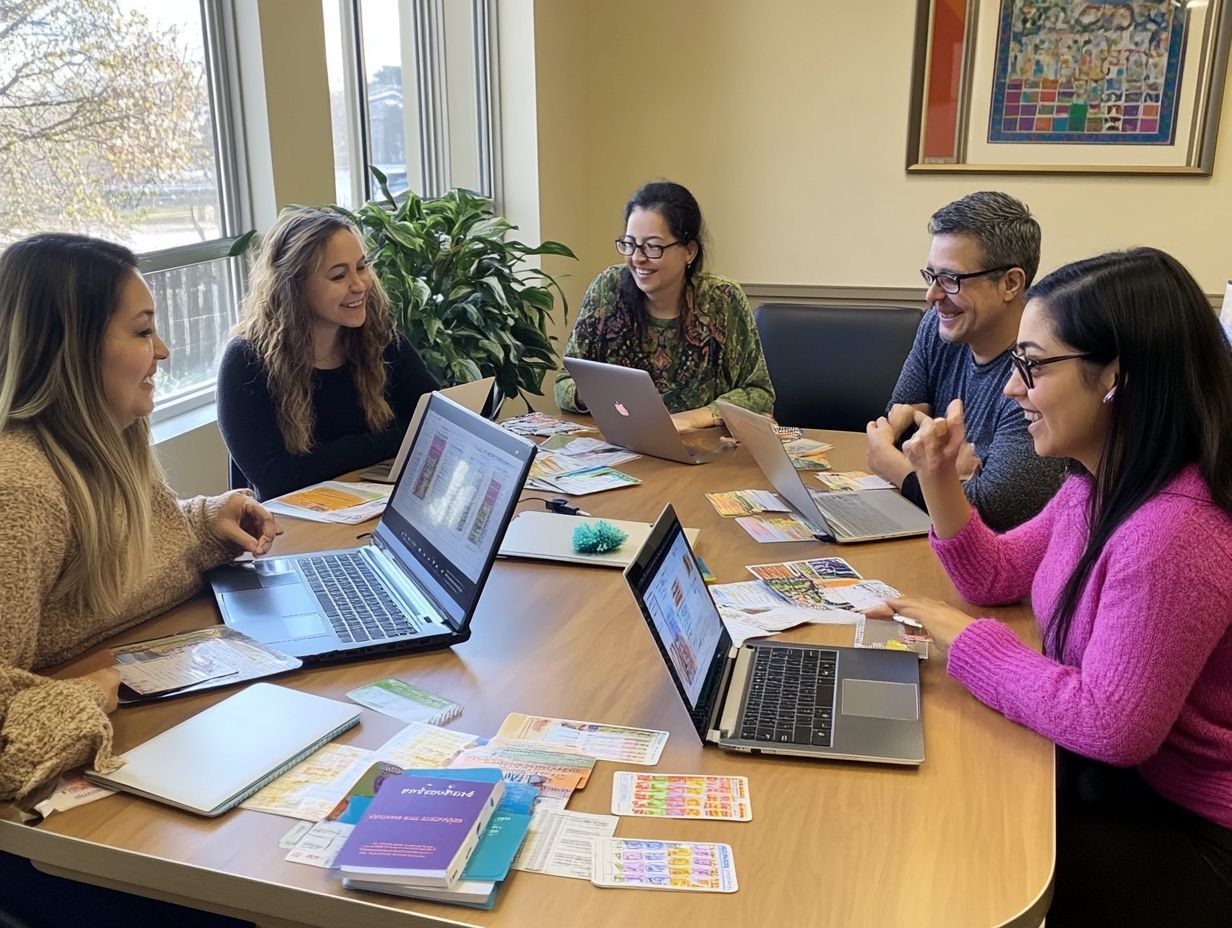7 tips for improving language pronunciation
Mastering a new language encompasses much more than just vocabulary and grammar; pronunciation is integral to effective communication.
If you’ve ever grappled with articulating words clearly, you’re certainly not alone in that struggle.
This article presents seven practical tips designed to enhance your pronunciation skills, ranging from immersing yourself in native speakers dialogue to incorporating tongue twisters into your practice routine.
You ll uncover common pitfalls to avoid, the advantages that come with clear pronunciation, and the most challenging sounds that various languages present.
Get ready to speak with confidence! Let s dive in!
Contents
- Key Takeaways:
- 1. Listen to Native Speakers
- 2. Practice Daily
- 3. Record and Listen to Yourself
- 4. Learn the Phonetic Alphabet
- 5. Use Tongue Twisters
- 6. Work with a Language Partner
- 7. Take a Pronunciation Course
- What Are the Common Mistakes Made in Language Pronunciation?
- What Are the Benefits of Improving Language Pronunciation?
- How Long Does It Take to Improve Language Pronunciation?
- What Are the Best Languages to Practice Pronunciation?
- How Can One Overcome Fear of Speaking a New Language?
- What Are the Different Ways to Practice Pronunciation?
- What Are the Most Difficult Sounds to Pronounce in Different Languages?
- Frequently Asked Questions
- 1. Here are the 7 tips for improving your language pronunciation:
- 2. How can listening and imitating native speakers help improve pronunciation?
- 3. Why is regular practice important for improving language pronunciation?
- 4. How can recording and listening to yourself help improve pronunciation?
- 5. What are some effective ways to focus on one sound at a time?
- 6. How does paying attention to stress and intonation improve pronunciation?
Key Takeaways:

Improve your language pronunciation by regularly listening to native speakers and mimicking their pronunciation. To enhance your learning experience, consider these 7 tips for language immersion at home. Dedicate time every day to practicing your pronunciation through speaking and listening exercises. Record yourself speaking and listen back to identify areas for improvement and track progress over time.
1. Listen to Native Speakers
Listening to native speakers is a crucial step for you as an English learner aiming to enhance your pronunciation. This helps you understand the subtle nuances of the language, including accent, rhythm, and intonation.
Engage with different audio resources like podcasts and TED talks to immerse yourself in authentic English communication. This reinforces your ability to recognize sounds and syllables while pinpointing areas for improvement in your pronunciation.
Through active listening, you can better grasp which everyday words and more complex terms require specific stress and emphasis, ultimately refining your speaking skills. Exposure to a variety of accents be it North American, British, or Australian equips you with a broader understanding of English sounds.
This rich auditory experience enriches your vocabulary and encourages adaptability in diverse conversational contexts. For instance, a podcast featuring Australian hosts might introduce you to distinct slang. A British TED talk could highlight the melodic cadence of their speech.
Utilizing these resources enables you to pick up on subtle differences in pronunciation, fostering greater confidence and proficiency in your spoken English. This, in turn, makes your communication more effective and engaging.
2. Practice Daily
Establishing a daily practice routine is crucial for anyone seeking to improve your pronunciation in English. Consistency is the key that unlocks gradual yet significant improvements in your speaking skills and accent refinement.
Incorporating a variety of daily exercises can elevate your journey toward clearer communication. For example, practicing functional words those small grammatical gems along with content words that hold meaning can dramatically improve your mastery of stress patterns and intonation.
Participating in focused speaking exercises not only polishes your pronunciation but also strengthens the jaw muscles vital for effective speech. Simple actions, like exaggerating sounds during warm-ups, can significantly enhance your muscle memory, making clearer articulation much more attainable.
By consistently addressing those specific pronunciation challenges, you ll notice a profound improvement in your overall communication skills.
3. Record and Listen to Yourself
Recording yourself while practicing English pronunciation is an incredibly effective way for you to pinpoint any weaknesses in your pronunciation. This method allows you to critically evaluate your speaking skills and make the necessary adjustments to improve.
As you revisit these recordings over time, you ll gain valuable clarity on your progress and start to recognize those persistent mistakes that might have slipped under your radar before. This reflective practice not only shines a light on the areas that need your attention but also nurtures a sense of ownership over your language journey.
Comparing your recordings to those of native speakers can offer you invaluable insights into authentic pronunciation patterns. Adding a virtual pronunciation coach to your toolkit can elevate this process even further, providing you with tailored feedback that addresses your specific challenges, giving you the power to refine your skills with greater effectiveness.
Start practicing today and transform your speaking skills!
4. Learn the Phonetic Alphabet
Learning the International Phonetic Alphabet (IPA) is essential for mastering English pronunciation. It provides a clear way to understand the unique sounds and syllables of the language.
With the IPA, you can spot subtle pronunciation differences that might otherwise escape you. This is especially helpful with unfamiliar words.
Take “though” and “thorough.” They look alike but sound different. Learning the IPA symbols helps you master these nuances, broadening your vocabulary and boosting your communication skills.
You ll express your thoughts more accurately, gaining confidence in tackling new words and pronouncing them correctly.
5. Use Tongue Twisters

Tongue twisters can dramatically boost your English accent. They help you speak different sounds clearly and strengthen your jaw muscles.
Try these fun phrases:
- “She sells sea shells by the sea shore.”
- “Peter Piper picked a peck of pickled peppers.”
These exercises are enjoyable and effective, whether you’re practicing alone or with a partner. They improve your vocal control and enrich your fluency.
6. Work with a Language Partner
Collaborating with a language partner is an exciting way to practice speaking. You ll get immediate feedback, making your learning experience much more effective.
Engage in meaningful conversations and share tips you’ve discovered along your journey. This supportive atmosphere enhances the experience for everyone involved.
This approach lets you address your specific pronunciation challenges in real-time. Adjust based on constructive feedback from your partner.
7. Take a Pronunciation Course
Enrolling in a pronunciation course can significantly enhance your journey to mastering English pronunciation. You ll get structured guidance from experienced instructors.
These courses target specific pronunciation challenges like vowel sounds or consonant clusters (groups of consonants together in words). Tackling these can improve your clarity and confidence.
Choose between flexible online sessions or in-person classes that foster a supportive environment. Pick what suits your lifestyle best!
Combine professional lessons with self-study for a comprehensive experience. This not only reinforces your skills but inspires you to keep improving.
What Are the Common Mistakes Made in Language Pronunciation?
Common mistakes in pronunciation can make it hard to communicate clearly in English. Non-native speakers often struggle with unfamiliar sounds and syllables.
For example, many learners mispronounce words ending in ‘-ed’. These endings can sound like ‘t,’ ‘d,’ or ‘id,’ depending on the previous sound. This can lead to misunderstandings.
Vowel sounds are tricky too. Distinguishing between short and long vowels can be challenging for many learners.
To improve, focus on listening exercises and repeating audio samples. Engaging with native speakers and using pronunciation-focused language apps can help.
What Are the Benefits of Improving Language Pronunciation?
Improving your pronunciation brings many benefits! You ll develop better communication skills, gain confidence when speaking, and create a more authentic English accent. This can significantly enhance your social and professional interactions.
When you master pronunciation, you could see changes in as little as a few weeks! Your vocabulary may expand as you become more comfortable using new words. This enriched vocabulary allows you to express your thoughts more clearly and improves your overall comprehension during conversations.
Effective pronunciation leads to smoother and more engaging interactions whether in casual discussions or formal presentations. You can connect meaningfully with others, fostering relationships built on clear understanding and shared ideas.
Communication skills play a vital role in your everyday life!
How Long Does It Take to Improve Language Pronunciation?

The time it takes to improve your pronunciation varies from person to person. It depends on how much time you dedicate to practice and the methods you incorporate into your routine.
You might notice a shift in your pronunciation within just a few weeks of committed practice! For others, it may take several months or even years to gain the confidence they seek. For example, daily conversations with native speakers usually yield quicker results than occasional practice.
Here are some effective strategies to consider:
- Utilize apps that provide pronunciation feedback.
- Engage in shadowing exercises using videos.
- Join conversation clubs to create initial speaking opportunities.
Remember, consistent effort is crucial for success! Dedicating even just 15 to 30 minutes each day to focused practice can lead to significant improvements over time.
What Are the Best Languages to Practice Pronunciation?
Among the countless languages spoken globally, English stands out as a premier choice for pronunciation practice. Its diverse accents and abundant resources make it excellent for learners like you.
While English has its merits, languages like Spanish and Italian are also celebrated for their phonetic richness. Spanish, with its clear vowel sounds, offers fantastic resources like FluentU, which uses real-world videos to enhance your pronunciation skills.
Similarly, Italian is known for its melodic intonation. You can take advantage of platforms like iTalki to connect with native speakers, adding depth to your practice.
To practice effectively in these languages, consider using techniques such as:
- Shadowing native speakers.
- Recording your voice for self-review.
- Using mobile apps like Pimsleur or Duolingo for guided pronunciation drills.
With these strategies, you ll be well on your way to refining your pronunciation in no time!
How Can One Overcome Fear of Speaking a New Language?
Overcoming the fear of speaking a new language is a challenge many learners face. However, with the right strategies and support, you can effectively address this hurdle and enhance your communication skills.
One practical approach to tackling anxiety is to engage in conversations with a language partner. You must practice speaking in a comfortable environment to build confidence!
Recording yourself can also be a game changer. It provides valuable feedback that helps you identify areas for improvement while boosting your self-confidence.
Gradually exposing yourself to speaking opportunities whether through casual chats or formal presentations allows you to build confidence organically. Each of these steps helps lessen your fear of speaking. They also encourage regular practice, paving the way for fluency.
What Are the Different Ways to Practice Pronunciation?
There are countless effective methods to refine your pronunciation, each offering distinct advantages. You might consider working with an online pronunciation coach or having fun with tongue twisters in your daily routine.
By shadowing native speakers through videos or podcasts, you can closely mimic the subtleties of intonation and rhythm. This significantly enhances your overall fluency. Using specialized pronunciation apps can provide you with instant feedback, enabling focused improvement on tricky sounds.
Incorporating both everyday dialogue and more complex vocabulary into your exercises ensures a well-rounded approach. This tackles various pronunciation challenges. These methods not only make practice enjoyable but also empower you to confront specific weaknesses, ultimately building your confidence in speaking. Dive into these tips today and start your journey to clearer pronunciation!
What Are the Most Difficult Sounds to Pronounce in Different Languages?
Different languages present unique challenges when it comes to pronunciation, particularly with certain sounds that can be tricky for those unfamiliar with their sound patterns, including English.
Take, for example, the distinction between the / / sound in “think” and the / / sound in “this.” Speakers of languages that don t feature these sounds may find it difficult to differentiate between them. Similarly, if you are a French speaker, you might struggle with the English /h/ sound, as it tends to be silent in your native tongue.
To effectively address these pronunciation challenges, targeted practice is essential. Engaging in exercises that focus on minimal pairs can help you distinguish between similar sounds. Using the International Phonetic Alphabet (IPA) can help you visualize and emulate these tricky sounds more accurately, ultimately building both confidence and clarity in your speech.
Frequently Asked Questions

1. Here are the 7 tips for improving your language pronunciation:
The 7 tips for improving language pronunciation are:
- Listen carefully and imitate native speakers.
- Practice regularly.
- Record yourself and listen for mistakes.
- Focus on one sound at a time.
- Use tongue twisters.
- Pay attention to stress and intonation.
- Get feedback from a native speaker or language teacher.
2. How can listening and imitating native speakers help improve pronunciation?
Listening carefully to native speakers can help you become more familiar with the sounds and rhythm of the language. By imitating them, you can practice pronouncing words correctly and improve your overall pronunciation.
3. Why is regular practice important for improving language pronunciation?
Regular practice is important because it helps your mouth and vocal muscles become more accustomed to producing the sounds of the language. It also allows you to build muscle memory, making it easier to pronounce words correctly.
4. How can recording and listening to yourself help improve pronunciation?
Recording yourself speaking in the language and listening back can help you identify mistakes or areas that need improvement. It can also help you become more aware of your own pronunciation and make adjustments accordingly.
5. What are some effective ways to focus on one sound at a time?
One effective method is to practice a specific sound or group of sounds each day.
You can use word pairs that differ by just one sound to help you focus on and improve those specific sounds.
6. How does paying attention to stress and intonation improve pronunciation?
Stress and intonation are vital for conveying meaning in any language.
By focusing on these aspects, you can boost the clarity and impact of your speech!





